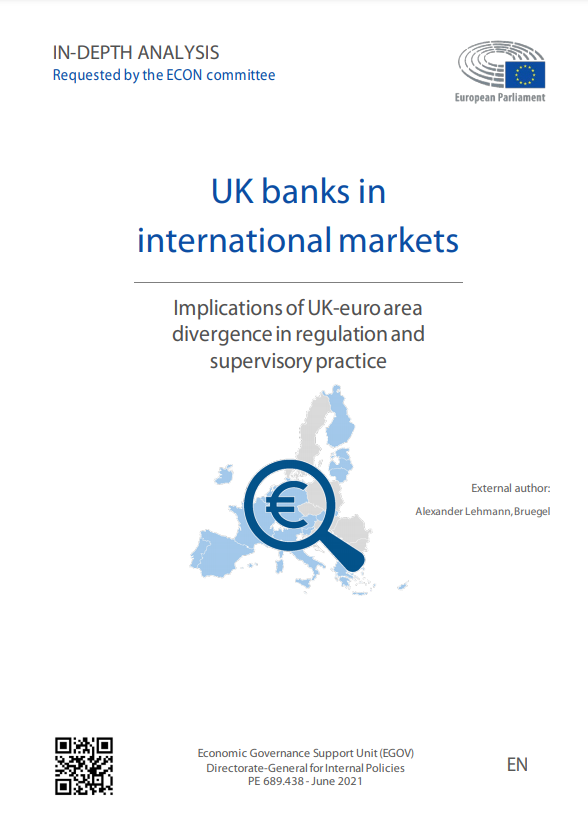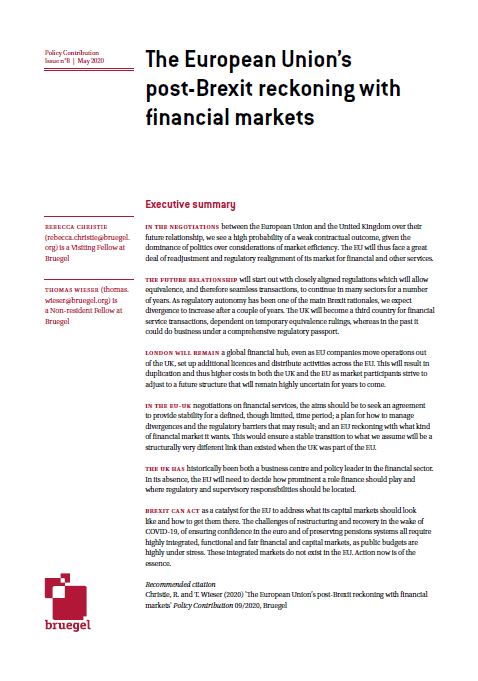Blog Post
The Brexit withdrawal agreement
On November 14th the UK government cabinet approved the draft text of the withdrawal agreement, the deal reached between EU and UK negotiators. The decision was followed the next day by the resignations of several members of Parliament. We review the first reactions in the blogosphere.
Martin Wolf writes that Theresa May’s terrible Brexit deal has united the UK in horror. For Remainers, it is evident that this quasi-permanent halfway house, which will keep the UK inside the EU’s customs area and divide Northern Ireland from the rest of the UK indefinitely, would be far worse than continued EU membership. For Leavers, it is equally evident that this very same halfway house would be far worse than a clean break. Britain cannot at present resolve its relationship with the continent. This is the one clear truth. Comparisons with the 1956 Suez crisis do not get close to the mark. Wolf thinks that this is a far more significant mess than that.
Martin Sandbu disagrees, and thinks that May enters Brexit endgame from position of strength; there are no alternatives to the prime minister’s plan, and no time to find them. In a country as extremely polarised as the Brexit referendum showed the UK to be, a real compromise will necessarily displease virtually everyone. But precisely because of polarisation, only a compromise unloved by all can conceivably be made to stick, unlike any policy that satisfies one side at the cost of alienating the other.
Sandbu argues that May wins in more than one way. First, getting a temporary customs union for the whole country into the legally binding withdrawal agreement is a real concession. Second, and in Sandbu’s view under-appreciated, the temporary arrangements set out in the withdrawal deal look virtually indistinguishable from where May will try to land the permanent future trading relationship. As she remains wedded to securing lasting frictionless trade in goods between the UK and the EU, Sandbu argues that May’s Chequers White Paper proposals will have to evolve in the direction of a permanent customs union, with a credible commitment to remaining aligned with a wide scope of EU rule-making on the production and trading of goods, including those defining the level playing field. Once this happens, not only will the EU have good reason to accept it, but there will be little difference between the temporary all-UK backstop and the new permanent relationship: one can almost seamlessly segue into the other.
John Springford at CER argues that since the agreement is largely on the EU’s terms, it only provides some crumbs for supporters of hard or soft Brexit. EU officials described the backstop as a ‘swimming pool Brexit’, with the UK as a whole in the shallow end of a customs union and Northern Ireland in the deep end, participating in the single market for goods – if there is no other agreement on the future relationship that prevents a hard border returning to the island of Ireland by the end of the transition period. Yet the customs union is extremely minimal. If the backstop is triggered, the UK will maintain the EU’s tariff regime, which prevents customs checks in the Irish sea and between Great Britain and the continent. But the backstop does not cover regulatory agreements between the EU and the UK.
Springford thinks that the direction of travel is towards a customs union for the whole UK. If talks break down, the UK will be in a bare-bones customs union, thanks to the backstop. A customs union is in the EU’s interest, because it maximises the territorial extent of its tariff regime, providing it with a larger market to sell to other countries in their own trade negotiations. A customs union is now the baseline for the future relationship, and soft-Brexiters can press for full single market participation to complement a customs union during the transition. That is, of course, if May survives and wins the parliamentary vote.
Writers at the Economist Intelligence Unit (EIU) think the resignations have demonstrated that, despite the UK cabinet’s notional approval of the deal, May has not secured full support for it and will remain under pressure to amend its most contentious aspects. The political declaration on the future relationship was fairly broad-brush. Threats from UK MPs to vote against the agreement have placed pressure on May during the negotiations, but for now the EIU maintain their view that a majority will ultimately vote in favour.
Charles Grant thinks that if Parliament votes against the deal, there are just five possible outcomes. First, the default option is for the UK to leave without a deal, but possibly with both sides taking steps to avoid the worst (through “mini-deals”). Option two is that Parliament urges the British government to go back to the EU and achieve a better deal. Because the EU wants to encourage Parliament to vote for May’s deal, the Union says it would not agree to re-opening the Brexit package – although it may revise the political declaration. The third option is that if there is a blockage in Parliament and renegotiation has failed, and the UK is drifting towards the ‘cliff edge’ of a no-deal Brexit, a general election could become attractive. The fourth option is a so-called People’s Vote: the case for a second referendum is that when the British voted in June 2016 they had a choice between the EU they knew, and an abstract Brexit that was never defined. The fifth and final option is that, faced with no deal – with neither a renegotiation, nor an election, nor a second referendum proving viable – MPs swallow their scruples and vote for May’s deal, in what they consider to be the national interest. Options two, three and four would require some extension of Article 50. Any EU decision to extend Article 50 would require unanimity among the 27 governments. The EU would be reluctant to take such a step.
Sam Lowe thinks the agreement includes a “backstop to the backstop”, a potential fail-safe to guard against the UK pulling out of the all-UK customs union in Annex 2, Article 6 of the Northern Ireland protocol. If the EU assesses that the UK has failed to comply with the rules governing the EU-all-UK customs union, and particularly the Great Britain element, the EU can unilaterally levy tariffs on goods entering its territory, leading to a potential customs border in the Irish Sea. Lowe thinks that there is no indication that this is something UK would deliberately trigger, but it reads like an ultimate safeguard against the UK deciding to breach its obligations under an international treaty.
David Henig notices that there is to be a UK-wide customs union, but Northern Ireland is to be subject to a 90-page list of single-market regulations, while the rest of the UK is not. The EU did not want a UK-wide element at all, so this represents something the UK had to push for; in return, the EU has put in place level-playing-field mechanisms on environment, labour, and state aid, but they aren’t subject to arbitration. The UK managed also to negotiate a fishing exemption during a customs union, a demonstration of how the negotiation worked: hard for UK to alter fundamentals, but it could get specific asks.
The customs union is not in fact fully defined, and the two sides have to agree how it will actually operate by July 2020, and the UK gets the opportunity to extend the transition period on a one-off basis – again, something with which the EU were never fully comfortable. In conclusion, Henig thinks that business and individuals will be very happy with the level of certainty that this will provide until 2020 and the possibility of that extending, but less so with the inadequate consultation and limited customs union provisions.
Steve Peers looks at the legal effect of the withdrawal agreement. He argues that the level-playing-field commitments on environment, labour and tax law will please Labour but dismay Tory Brexiters, whereas commitments on competition, public companies/monopolies and state aid will achieve just the opposite. Most of the level-playing-field commitments are not subject to the withdrawal agreement’s rules on dispute settlement, so it is not clear how arguments will be settled. Peers believes that the Northern Ireland protocol includes instead specific rules on enforcement that the UK should perhaps have more vigorously resisted. On CJEU jurisdiction over cases from UK courts, the UK seems to have won.
Alex Barker also has a twitter thread on the agreement which is worth reading. Barker notices the inclusion of a five-person arbitration panel for disputes, which is not unusual – there is something similar in the Ukraine-EU agreement, for example – but importantly in the UK case cannot rule on any issue relating to EU law (of which there are plenty in the withdrawal agreement). Barker also argues that the language on the backstop suggests the European court has direct jurisdiction over Northern Ireland with respect to EU law applied under the backstop, and the Commission has direct powers too.
David Allen Green writes that the shock and outrage from the pro-Brexit European Research Group of UK politicians is either synthetic or ignorant. There is nothing in the agreement that should be a real surprise, even if it is a disappointment. In December 2017, the obvious implication of the Joint Report was that Northern Ireland would remain in the single market and customs union, and that meant the UK would also have to. Now the draft agreement passes from the realm of law and policy to that of politics, and here the position is far less clear.
There is a non-trivial chance that the UK Parliament will not accept the withdrawal agreement, according to Green. But politicians threatening to vote against the withdrawal agreement therefore run a serious risk. A departure without a withdrawal agreement would have catastrophic consequences for cross-border trade and legal certainty and for those UK and EU citizens relying on EU rights. While some of the hard Brexiters may not mind this, those on the Remain or soft-Brexit side will be trusting that there is an intervening event to avoid a no-deal Brexit. But the problem for those on the Remain or soft-Brexit side, Green argues, is that there is no firm indication of such an intervening event. So it would seem irresponsible to seek to vote down the withdrawal agreement, hoping that the EU or the UK government will blink.
Republishing and referencing
Bruegel considers itself a public good and takes no institutional standpoint. Anyone is free to republish and/or quote this post without prior consent. Please provide a full reference, clearly stating Bruegel and the relevant author as the source, and include a prominent hyperlink to the original post.








